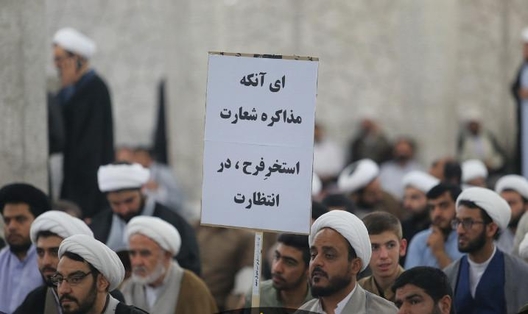 On August 16, a number of young hardline clerics held an anti-government protest in Qom that highlighted differences among conservatives.
On August 16, a number of young hardline clerics held an anti-government protest in Qom that highlighted differences among conservatives.
The rally was supposed to be against “financial corruption” and “government mismanagement,” but the banners held by the attendees, which contained messages threatening moderate President Hassan Rouhani, turned the event into an even more controversial demonstration, with moderates and reformists attacking the organizers.
A few conservative grand ayatollahs unexpectedly came forward to condemn the rally. What angered them weren’t the banners but a speech by a hardline theorist.
Hassan Rahimpour Azghadi stated at the rally that “Darse Kharej (courses at the highest level of religious curriculum taught to students at seminaries) which are being held, focus [only] on secular Islamic jurisprudence instead of theorizing religious civilization and don’t [teach] anything regarding the banks, social relationships and like issues.”
He continued: “The root of secularism is the seminary. Secularism means the separation of religion from the state, government and civilization.”
In reaction, Grand Ayatollah Naser Makarem Shirazi, a usual supporter of conservatives, issued a harsh statement on August 20, describing the gathering as “catastrophic.”
“The clerics were invited to speak out about the economic issues [of the country], but everything changed, and the speaker who had no information about the state of the Shia seminaries uttered the worst insults against the seminaries and marajas (highest-ranking authorities in the Twelver Shia community, who execute Islamic law),” the ayatollah said.
Moreover, grand Ayatollah Hossein Nouri Hamedani, who is close to conservatives, remarked on the same day: “The seminary has never been secular and is not. Why such a person who has no knowledge of the seminary should be brought to the seminary?”
In response, Azghadi stated on September 2 that he had merely reiterated the views of Islamic Republic founder Ayatollah Ruhollah Khomeini. “It is really intriguing,” Azghadi said. “These were the Imam’s [Khomeini’s] remarks, and we don’t dare to say it [today].”
Following the controversy, hardline media including Kayhan and Vatan-e-Emrooz newspapers published editorials in favor of Azghadi. Concurrently, the new generation of hardliners joined the campaign, tweeting in support of Azghadi, who was under fire from the grand ayatollahs.
In Qom, which is the center of Shia Islam and a major influence on the country’s domestic and foreign policies, there has been always a struggle over “Seminary independence.” Although hardliners such as Ayatollah Mohammad Taghi Mesbah Yazdi long ago assumed predominant power and influence in Qom, there are still a number of grand ayatollahs and senior teachers who vehemently disagree with them.
The hardliners’ attempts at marginalizing traditional grand ayatollahs entered a new phase ahead of the 2013 presidential election. A new group was created under the name of “Establishment of the teachers of supreme level and Darse Kharej level” with the support of hardline ayatollahs including Mohammad Yazdi and former judiciary chief Mahmoud Hashemi Shahroudi. The group appeared aimed at grooming new teachers based on their political views. At the time, the movement raised concerns among some conservative grand ayatollahs.
This movement is in line with the constant call for a “revolutionary seminary” by hardliners such as Mohammad Yazdi, the secretary of the influential “Society of Seminary Teachers of Qom.” He has repeatedly criticized the Qom seminaries’ classes and approaches, which according to him give short shrift to politics. “Some gentlemen believe that they have the best classes, [but] how many times have they talked about the political system in the last or the initial moments of their classes so that the students reach a decision? To support the political system or not?” Yazdi said in December 2017.
Referring to the contentious subject of “Seminary independence,” Yazdi continued: “Does the seminary students’ independence mean that they should have nothing to do with others, and should only be busy with their study and praying… [Students of seminaries] assume that the meaning of independence is to distance themselves from the political system.”
In another speech in August 2017, Yazdi noted: “There are teachers and prominent figures who pay no attention to the today issues, and… they don’t mention the issues [in their classes]. They don’t say a word about the Islamic Republic political system.”
According to hardliners, the Qom seminary and its grand ayatollahs and teachers haven’t done enough to defend the Islamic Republic’s political system and provide ideas for strengthening the system. They opine that what is being taught in the seminaries is limited to Sharia law about praying and other daily duties of a Muslim. That is why they call the seminary “secular,” with classes teaching “secular” Islamic Jurisprudence, avoiding contentious issues regarding international relations and political science.
A revolutionary seminary, based on the hardliners’ view, wouldn’t shy away from involvement in the political affairs of the country or confine its support for the political establishment to decisive moments. Such a seminary should always be busy theorizing in support of the Islamic Revolution.
Meanwhile, there seems to be a resistance force within the seminary about refraining from such politicization, consisting of grand ayatollahs and senior teachers from different political spectrums. This force includes a number of conservative grand ayatollahs such as Makarem Shirazi who do not want the seminaries involved in all aspects of the country’s governance.
The mentioned rise of a new group in 2012, and Azghadi’s heated speech, as one of the leaders against the current approach of the seminaries, may be a significant turning point. By forming new groups in Qom and speaking out publicly against the present behavior of the seminaries, these forces are grooming and mobilizing new teachers and ayatollahs who may undermine the influence of Qom’s more traditional voices.
Rohollah Faghihi is an Iranian journalist based in Tehran. He is a contributor to Al-Monitor, Foreign Policy, Middle East Eye and the American Conservative. Follow him on Twitter: @FaghihiRohollah.
Image: Cleric holding protest sign in Qom on August 16 (Sarpoosh)
